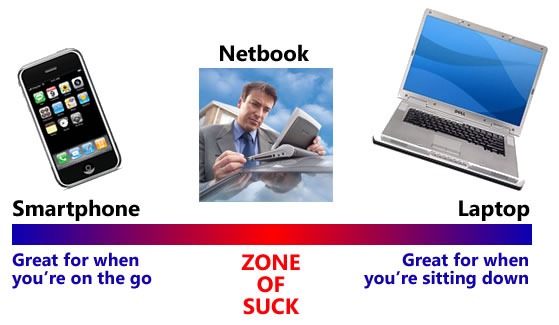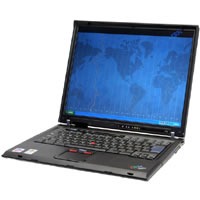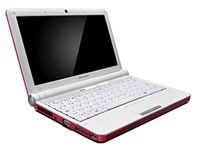
Here’s an idea sent to me by a friend of mine who’s not a computer programmer, but a “suit” working at a Bay Street firm in Toronto (for those of you not from Canada, “Bay Street” is Canadian for “Wall Street”).
Consider two systems, with specs as shown below:
| Component | System A | System B |
| Processor | Intel 1.6 GHz w/ 533 MHz bus | Intel 1.6 GHz w/ 533 MHz bus |
| Memory | 1 GB RAM | 512 KB RAM |
| Hard drive | 160 GB, 5400 RPM | 80 GB, 5400 RPM |
| Display | 1024 * 600 WSVGA | 1024 * 768 WSVGA |
| Graphics card | 3D-capable graphics card, also capable of extending the screen onto an external monitor | 3D-capable graphics card, also capable of extending the screen onto an external monitor |
| Networking | 802.11b/g wifi | 802.11b/g wifi |
| Operating system | Windows XP (and probably runs Windows 7 just fine) | Windows XP (and probably runs Windows 7 just fine) |
Although the systems are quite similar, they are from two different generations of portable computer:
- One is an IBM/Lenovo Thinkpad T42 laptop from 2005 (pictured below and to the left), and
- The other is a Lenovo S10 netbook from 2009 (pictured below and to the right).
Which one is System A and which one is System B?


It turns out that System A is the current-model netbook and System B is the 5-year old laptop.
My friend writes:
Netbooks are nothing other than stripped down laptops stuffed into smaller boxes. You wouldn’t buy a 5 year old notebook with the expectation that it would perform like a new one, would you?
The analogy I used when I bough a netbook is that it is like the second vehicle. I use it to run around town and do the small errands. It’s small, convenient and easy on gas but for the heavy lifting or processing, I use my laptop SUV/Minivan.
Previous entries in the Netbooks Suck series of articles:
7 replies on “Netbook 2009 == Laptop 2005 (or, “Netbooks Suck, Part 3)”
You may be understating the RAM in System B just slightly…
That fact that you didn’t mention the sticker price for these computers is conspicuous. Netbooks are cheap and portable. Some people who would scoff at the lifetime cost of a smartphone would be just fine with a $100 7-Eleven phone, a netbook and a Starbucks card.
The Thinkpad retailed for ~$2300 from IBM in 2005 (http://www.notebookreview.com/default.asp?newsID=2520) while the netbook retails for ~$360 now (http://shop.lenovo.com/us/notebooks/ideapad/s-series). A quick search of refurb T42s brings up a retail price of ~$330 and doesn’t even meet the specs you quote above. Without getting into a deeper comparison (battery life, weight, footprint – all important considerations), the netbook is still a great deal. And like the Thinkpad was more than adequate for users of 2005, the netbook is adequate for many users in 2009 who just want email, web and office tools. Yes, you can do two of those three on an iPhone but try writing a 12-page report or a presentation on a phone while in a cafe or on the plane. Netbooks are great for that. Phones or bulky laptops, not so much.
Yes, the title Netbooks Suck is intentionally provocative. My belief is that while netbooks have a nifty form factor and a great price point, they do not represent a whole new category of computing. They’re desktop machines in a more convenient package. As their specs become closer to those of laptops, we’ll eventually cease to list them in a completely separate category and just consider them to be small notebooks. This is already happening: the price gap between netbooks and laptops is closing. For CAD$160 more than the S10, you can get the ThinkPad SL, which gets you a much better processor and memory.
I’m wary of people saying that 2005 specs are “good enough” for most people’s computing uses — it seems too reminiscent of the famous line “640K ought to be good enough for anybody. Yes, a lot of people are using web applications, but in an increasingly JavaScripty/Ajaxy/RIA world, I suspect they’re going to want more and more processor cycles.
When my stepdaughter wanted a cheap but robust laptop for graphic design, web surfing, making music CDs, etc. I recommended a refurbished T42. She adores that machine.
When I bought a laptop for my wife I got her an EEE. Unlike the T42, it fits in our diaper bag and she can put it on one knee while holding the baby. But it’s more functional for long facebook updates, editing google docs, etc. than any phone. She loves it.
I’ve thought about getting a netbook of my own but you’re right, it doesn’t hit a sweet spot for me. I think the netbook zone of suck is a developer-specific thing. For people like my wife they are perfect.
I still use my Aspire One as my main machine and it suits me well, usually with an external keyboard, mouse and monitor at home and office, but very nicely standalone in an airplane or cafe. I bought three netbooks in the last two years for altogether less than $1000, all run Linux, all are light, snappy, and convenient for me and my two daughters. Good value, and to me still looks like a valid market segment.
My wife uses my older Toshiba A30 with XP, and I also have my Dell 9400 (XP) and my Mac Mini and they serve their purposes well too.
What’s with the three posts to get the netbook suckage point across? Methinks you doth protest too much.
You’ve got something of a false comparison there; the S10 weighs about half what the T42 does.
Now, there’s an interesting conversation to be had about laptop size, I think. In the nineties, as the luggables faded away, one started to see most laptops around a fairly consistent size and weight- 5 to 7 pounds with a 12 or 13 inch screen. Anything bigger was a desktop replacement; anything smaller was an “road warrior” sublaptop. You’d pay a huge premium for either of those.
Over the next 15-odd years, laptops seemed to grow more than shrink. LCD screens got cheaper, and I suppose that it was easy to sell a big screen. The Toshiba Libretto was one of a very few pushes to sell a smaller laptop to consumers, and it didn’t make much of a mark. I think part of the reason netbooks are getting positioned as a separate category is because average notebook LCDs got so overgrown.